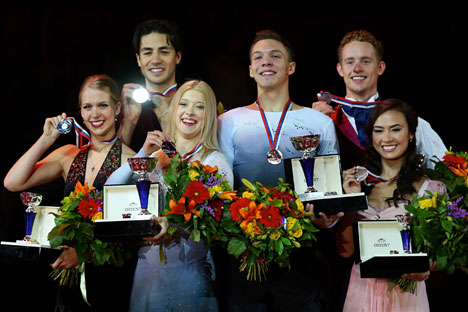
Awarding ceremony of Cup of Russia Grand Prix. Pictured L-R: Canadian Kaitlyn Weaver and Andrew Poje, Russians Ekaterina Bobrova and Dmitry Soloviev and Americans Madison Chock and Evan Bates. Source: ITAR-TASS
I have a confession to make.
To some, it will make me seem like less of a man; to others, I’ll be the dupe of a corrupt system, but I’ll come out and say it anyway.
I, a raging cynic, have fallen in love with figure skating and its relentless positivity.
Every four years, ahead of the Winter Olympics, skating comes in for a kicking from a certain type of sportswriter.
Some bring up the scandals (remember Tonya Harding anyone?), but many just laugh at the sequins or slide into outright homophobia, one writer in 2010 branding skating nothing more than a refuge for men “too afraid to come out to their families”.
I’ll admit sometimes I laughed too - though I never had time for the anti-gay stuff - and I didn’t particularly want to cover my first skating competition, last year’s Grand Prix Finals in Sochi.
Then I, a 24-year-old straight guy usually found at raucous soccer games - was won over.
Part of it is the sheer athletic skill involved - it’s not always clear on TV, but in person you can’t help but note the level of skill, power and poise needed to not only jump and rotate four times in the air before landing, but to do it with grace. And all of that ON ICE, a surface many people can barely stand on.
It’s not just that though. Psychologically, figure skating ranks among the world’s most compelling sports. Tennis is a one-on-one battle with the opponent, a sport whose history is littered with the broken careers of players who had the skill but were psyched out at the crucial moment. Figure skating is simpler and more brutal - it’s a battle against the self.
A men’s singles free skate is four minutes, 30 seconds alone on the ice in front of a crowd of thousands expecting near-superhuman feats. Watching a competition is seeing psychology at its most basic as the skater’s ego tries to override the id’s urge to run and hide. The slightest moment of self-doubt and a medal contender goes sprawling across the ice, physical and mental health both suddenly at risk.
Given the insane pressure involved, it stuns me how skaters stay so positive.
Covering, last week’s Cup of Russia Grand Prix in Moscow, I saw rival skaters joking together and, in one rather odd instance, repeatedly prodding one another with fruit during a press conference. The smiles on the ice may seem saccharine, but, more often than not, there’s genuine warmth behind them.
That same sentiment extends to the crowd, too. “It felt like the audience was dancing with us,” Canadian ice dancer Kaitlyn Weaver said last week in Moscow of the crowd that cheered her and partner Andrew Poje on, even though they came close to beating the hometown favorites.
That positive, even heartwarming, atmosphere makes skating’s occasional bad guys even more theatrical, no easy feat when they have to outdo the costumes on display. The one feud guaranteed to stay in the memory came in 1994 when associates of U.S. skater Tonya Harding attacked her rival Nancy Kerrigan with a baton. Nowadays, things are quieter, but the icy, ruthless demeanor of one young Russian skater still set my teeth on edge in Moscow.
At the same time on the other side of the city, CSKA and Spartak were contesting Russian soccer’s biggest rivalry in a very different spirit. I love sport’s tribal rivalries, but a little more positivity from the competitors is no bad thing - I’ve had enough of the sullen grunting of losing players.
Skating has its problems too, however. I always feel a certain unease when dealing with any sports that use judges. Just look at the extravagant, barely concealed corruption of boxing, still an Olympic sport despite all its tribulations. Skating reached its nadir at the 2002 Winter Olympics when a judging scandal led meant the pairs competition ended up with two gold medalists, but the sport’s since brought in a more-or-less reliable system that breaks each routine down move by move, giving dodgy judges less room to hide.
Skating isn’t in good health in North America, at least not the way it was 15 years ago when California’s Michelle Kwan ruled the roost - USA Today branded April’s deserted world championships in Canada “a wake.”
In Europe and Asia, it’s a different story. Last week’s Moscow Grand Prix event was packed to the rafters for the free skates, with fans coming from all over the world. And at a time when the Winter Olympics are trending younger with the introduction of X-Games-style extreme sports, maybe skating’s older, female fanbase can bring a bit of diversity to Sochi.
I’m looking forward to February’s Winter Olympics - can Canada’s Patrick Chan turn his world dominance in gold? Can Ashley Wagner of the U.S. hold off a phalanx of young Russians? - with undiluted longing.
It’s taken me a while but I’m not afraid to say it - I’m a figure skating fan.
All rights reserved by Rossiyskaya Gazeta.
Subscribe
to our newsletter!
Get the week's best stories straight to your inbox